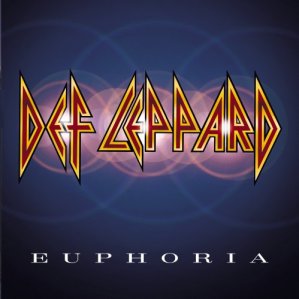Ten Years Later: Def Leppard
 Def Leppard – Euphoria
Def Leppard – Euphoria
June 8, 1999
Mercury Records
Victim of Loudness War? Yes
Def Leppard was in a tough spot in 1999. Their 80’s rock sound had gone out of style when grunge swept its forearm across the musical table and their subsequent attempt to update their sound to match the times (1996’s Slang) fell flat on its face despite including some of the band’s best songs. So, they could either forge ahead with their revamped style and face the consequences or retreat to the approach that gained them notoriety in the first place. Perhaps with a bit of cowardice in tow, the band chose the latter. Although sticking to their newfound guns might have proved more interesting, going back to the well proved to be artistically successful, as the water they drew resulted in Euphoria, perhaps their strongest effort since their massive 1987 hit, Hysteria.
Ten years down the line, Euphoria remains a bittersweet victory. The flop of the more adventurous Slang certainly struck a crushing blow to the band, which seemed eager to dabble in darker, less-produced territory. But Def Leppard’s true strength has always lied in arena-ready guitar hooks and infectious choruses, which is exactly what Euphoria delivers. The album’s first single, “Promises,” is straight off of Hysteria’s cutting room floor, complete with the group’s trademark layered choruses and wall-of-sound guitars. More of a callback than a rehash, the track set the stage for much of the same throughout the album, a factor that again appears safe on paper but proves somewhat more risky on tape.
The fact that Euphoria manages to stay reasonably clear of being a rote retread of the band’s past success proves to be somewhat of a miracle, given the odds stacked against it. After all, not only did the band return to its previously-successful sound and title preference (reference Hysteria and Pyromania before it), but they enlisted Mutt Lange to help them along. Lange, who can be largely credited with the band’s 1980’s success due to his production and songwriting prowess, contributes to three of the album’s best songs (the aforementioned “Promises,” “All Night” and “It’s Only Love”) and ensures that his trademark style is embedded throughout. But again, this only helps the band rather than hinder them, despite the fact that the elements Lange adds to the proceedings were so closely tied to the style Def Leppard had previously attempted to stray from in order to remain relevant.
The fact remains that Euphoria makes only one heinous mistake throughout its thirteen tracks, the embarrassing “Back In Your Face.” Like so many of Def Leppard’s peers that fully fell from grace with the advent of the Seattle sound, the band opted to include a track that announces their return to glory that comes off forced and ridiculous. A general rule of thumb should be that if you’re trying to make a comeback, it’s unbelievably hokey to sing a song about it. If the songs are good enough, there’s no need to make such a fuss about the whole thing being a “comeback,” especially with a chorus that includes the lyrics, “I’m back in your face/Like I’ve never been away/I’m back in your face/And it’s where I’m gonna stay.”
Despite such an obvious misstep as “Back In Your Face,” Euphoria is still a phenomenally good record. The band has yet to match it with any release since (despite the stiff competition of 2002’s X) and it still stands between leaders Hysteria and Pyromania as the band’s best album. If you can forgive their obvious desire to bring things back into safe territory rather than forge ahead on the road less traveled, then Euphoria will be an enjoyable listen throughout. After all, it doesn’t take a contrived song to realize that Def Leppard really were back in your face.
– Ian Rice
-
Archives
- February 2012 (1)
- September 2010 (1)
- December 2009 (3)
- October 2009 (2)
- September 2009 (3)
- August 2009 (7)
- June 2009 (4)
- May 2009 (1)
- March 2009 (1)
- September 2008 (1)
- July 2006 (1)
- May 2006 (2)
-
Categories
-
RSS
Entries RSS
Comments RSS